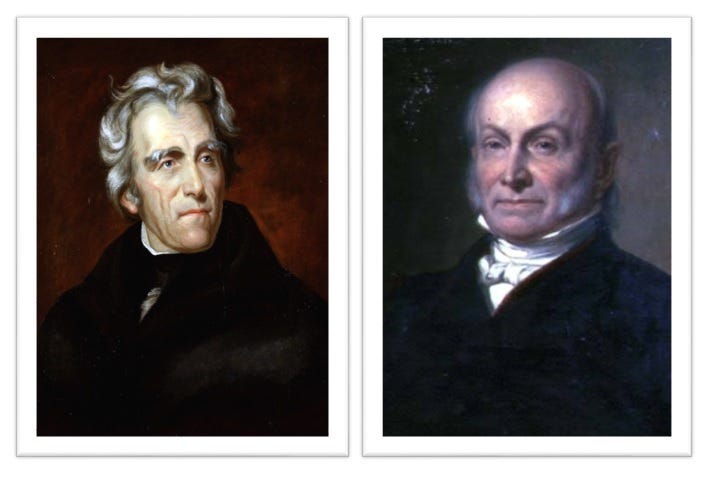TDIH: Jackson vs. Quincy Adams
If you think this election year is crazy, then you should also hear what happened in 1824!
If you think this election year is crazy, then you should also hear what happened in 1824!
That election was a four-way race: John Quincy Adams, Andrew Jackson, William Crawford, and Henry Clay had all thrown their hats in the ring.
Election results showed Jackson ahead, but he had only a plurality—not a majority—of both the popular and the electoral votes. When no candidate achieves an electoral majority, the Constitution provides for a back-up procedure in the House. In that contingent election, congressmen choose one of the top three vote-getters as President. Each state gets one vote.
The House had three options: Adams, Jackson, or Crawford. The constitutional provision didn’t allow Henry Clay to be considered because he’d placed fourth.
Congressmen reached a surprisingly quick conclusion: Thirteen states voted for John Quincy Adams, despite his second-place finish in the electoral vote tally. Jackson received the votes of only seven states. Crawford received four.
Jackson supporters were furious. Jackson had won the popular vote! Shouldn’t the House have voted for him? They also alleged that Adams received some of his states’ votes only because a “corrupt bargain” had been made between Adams and Henry Clay.
Clay wasn’t a candidate in the House election, remember. Thus, when he threw his support behind Adams, it was enough to swing many of his supporters in Adams’s favor. Adams denied the allegations of an inappropriate deal, but Clay later became Secretary of State and some people viewed the appointment as proof that a bargain had been made.
Adding fuel to the fire, reports emerged that Clay had initially tried to strike a deal with Jackson, but Jackson refused to “go to that chair” except “with clean hands.” Had Adams taken a deal when Jackson would not?
“We shall probably never know whether there was a ‘corrupt bargain,’” historian Paul Johnson concludes. “Most likely not. But most Americans thought so. And the phrase made a superb slogan.”
As a final note, Jackson’s claim that he won the popular vote garnered him a fair amount of sympathy among Americans at the time, but the claim is problematic. In the early years of our country, electors were not always chosen by a direct election among states’ citizens, as they are today. Instead, some state legislatures directly selected the electors. During the 1824 election, many of the states that supported Adams were still relying upon legislative selection, instead of a popular vote, for this purpose. Thus, there is simply no way to know what the popular vote tally would have been if all states had been conducting general popular elections as so many of Jackson’s states did.
Either way, Adams would hold office for only one term, just as his father had. As for Jackson, he would go on to win overwhelmingly in 1828. His inaugural party at the White House was one for the record books!
Naturally, that is a story for another day.
Sources can always be found on my website, here.



As the old saying goes “There is no honor among thieves” thus can also go among votes. Elections have been corrupt since the beginning of time it seems. With mail in ballots, drop boxes and collecting ballots in nursing homes has started it only seems to have gotten worse.
God save us all.
❤️🇺🇸🇺🇸🇺🇸
This would have torn most countries apart, but not here, again demonstrating the prescience of the Framers when constructing the Constitution…